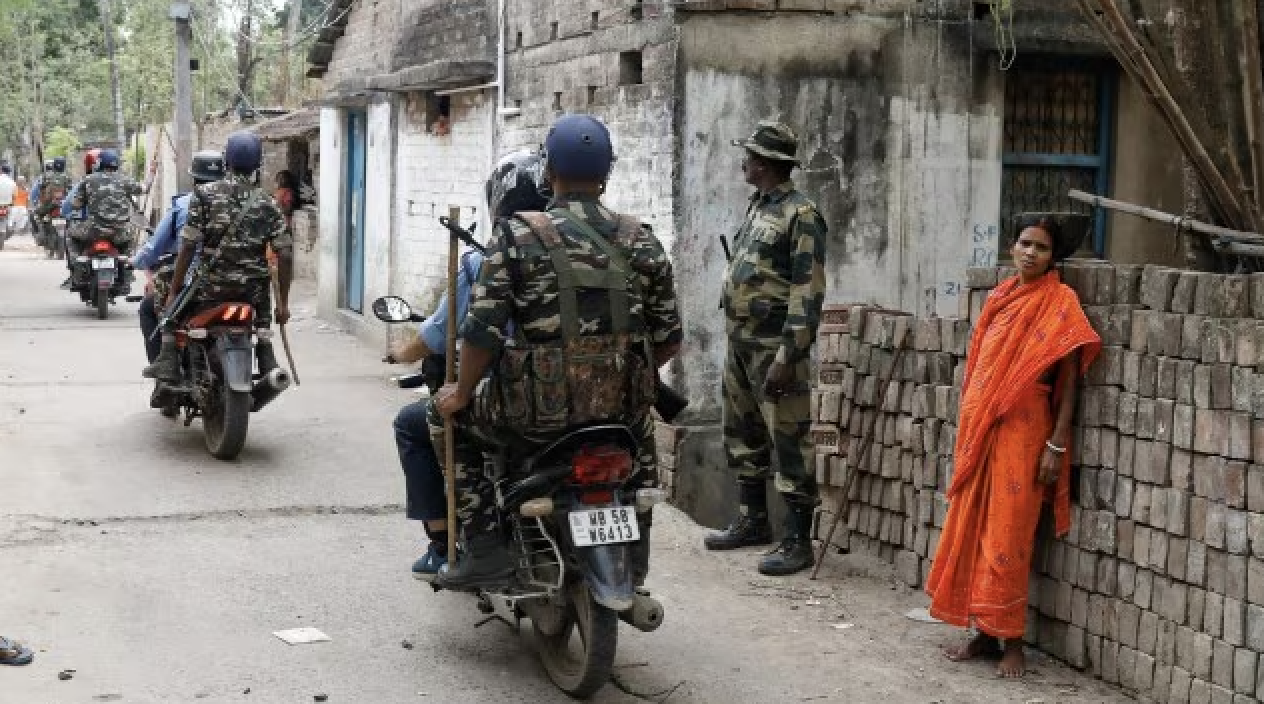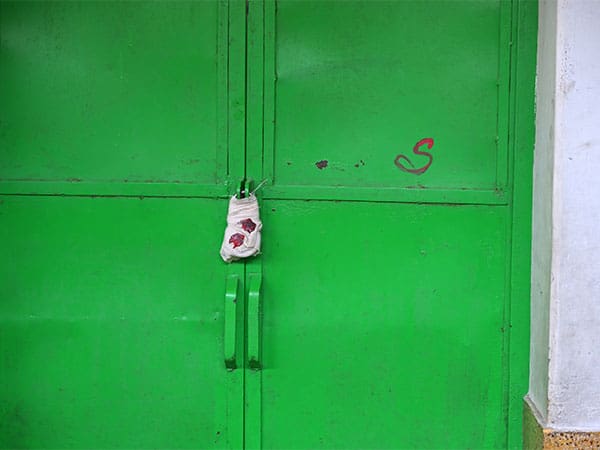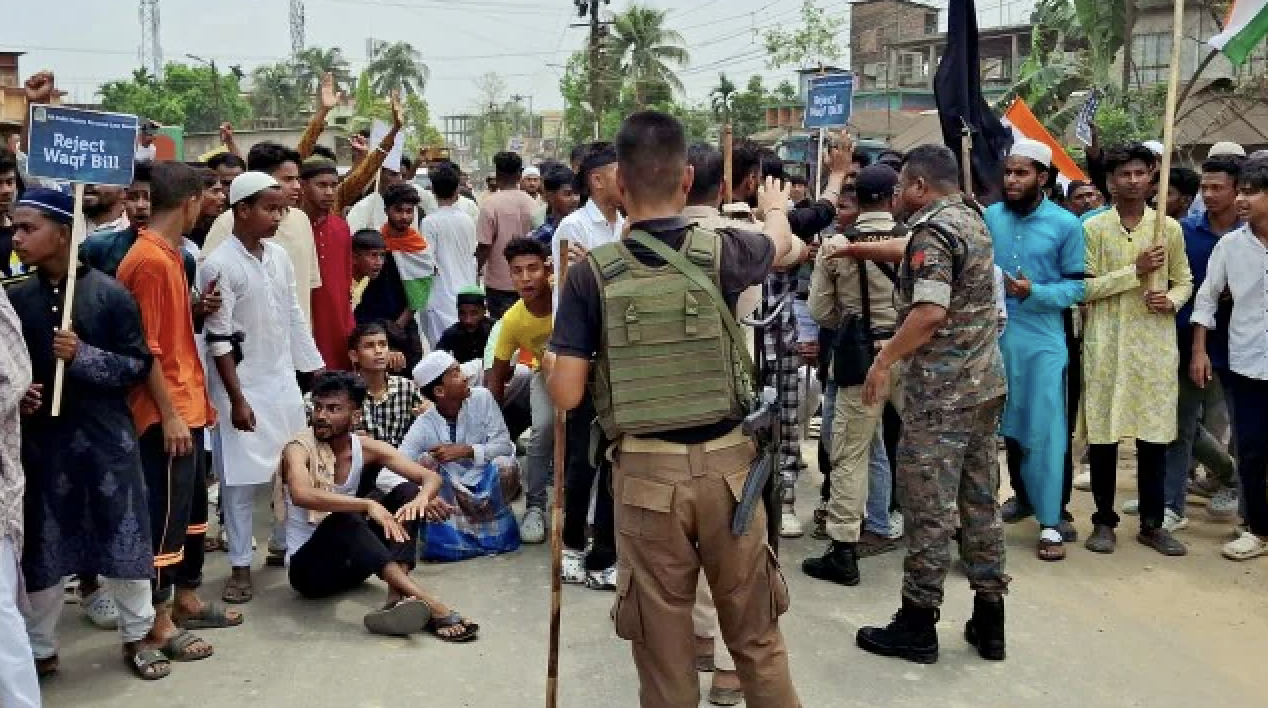
“I want to sleep just to see him,” she said. “Just once!”
A day before, 14-year-old Faisal Gulzar was trying to dodge the incoming bullets that pierced the concrete wall of a storeroom, surrounded by the apple trees with sprouted buds, in the Shopian district of south Kashmir, when his father was at a police station looking for his whereabouts.
The government forces had laid a cordon and search operation in the orchards of Reban Bandpawa village on 10 April, to hunt militants. After searches, the gunfight broke out. The government forces extended an offer to surrender. Faisal, trapped with two other men, denied.
On that spring evening, Faisal asked one of his fellow militants for the cellphone to dial home, one last time. His mother, Dilshada Gulzar picked on the other side. “I told him that he had four sisters [to look after] and he was young. I asked him to come out!” she recalled telling him. “He didn’t listen to me and he said that he couldn’t surrender now.”
Six days before this call, Faisal stood in front of Dilshada, clad in a new grey pheran — a traditional loose cloak — outside the narrow lane of his home. The mother-son waited for rains to stop so they could finish tiling the orchards before the season would end. “We will go after having lunch,” she had told him. “I will wait for you.”
She kept her word, he didn’t. Though he was late, Dilshada still served him a plate, hoping for an eventual return. The clock had touched 4 pm and Faisal’s phone was now switched off.
Dilshada stepped out in the rain, stood on the street to keep an eye towards the mosque. “I thought he might have gone to offer prayers like every day,” she recalled. “Everyone went to the mosque, only he didn’t.”
The cordons were frequent in Dilshada’s village. When a search operation started that day, the family thought Faisal might have been picked up. When they couldn’t sleep the entire night, next morning, the family searched for him in the village. Nothing. Then they marched towards the Zainpora police station to file a missing complaint.
“He was my only son. Everything was for him,” she said. “What could have we done? I was only crying. He was pampered, my beloved!”
Until a day before he left home, Faisal was just a tenth standard student at the National Innovations Public School in his village when the Jammu and Kashmir administration issued the orders for the closure of the schools — citing the surge in COVID-19 cases. His father dealt in used cars while he helped his mother in orchards.
But now the family’s searches for six days had ended when Faisal was trapped in the gunfight. Dilshada had never thought he would ever join the militancy. “If we had known, we wouldn’t have let him out of the house,” she said.
When he didn’t listen to his mother and dropped the call, the family was brought to the gunfight site later that evening. A dreadful odyssey to get her son to surrender began again. “Faisal se’aba, come out,” said Dilshada on the loudspeaker. “They won’t do anything.” No response was received.
When her repeated attempts were turned down, Dilshada was now one of the mothers of a minor militant. “I couldn’t bear the sound of bullets being shot in the direction where my son was,” said Dilshada. “The site was unbearable. So, I left.”
According to a report released by Save the Children last year, nearly 415 million children worldwide were living in conflict-affected areas in 2018. The children in the conflict were more likely to face grave consequences including being killed or recruited.
The recruitment of child combatants, whether by the government forces or militants outfits, is a violation of international humanitarian law, which states that children must not be recruited into armed groups.
Despite the law, many minors have succumbed to bloodshed across the globe in many conflict zones, including Kashmir. In May 2017, Faizan Ahmad Bhat, a 15-year-old boy was killed in an overnight gunfight with the government forces in Tral. A year later, sixteen-year-old Saqib Bilal and fifteen-year-old Mudasir Rashid Parray were killed in a gunfight in Srinagar outskirts.
After returning from the gunfight site, Dilshada had to just sit and wait only for the bad news. The next day, when the bullets had pierced through the walls of the storeroom, and its small windows had turned in ashes, two young men and Faisal lay dead inside.
“I was not in my senses,” said Dilshada, sobbing. “It is so hard for me to bear the loss of my son.”
On 15 April, the fifth day after his death, Dilshada, clad in embroidered pheran, sat in one of the less crowded corners of the huge lobby of her brother-in-law’s house, attending to the people coming to pay homage and condolences.
Dilshada, with bloodshot eyes, put up a strong face for her four daughters. “We all sleep together because I’m scared of being alone,” she said. “I don’t know how I’m living anymore.”
Faisal was the nineteenth militant of the Shopian district who was killed in a gunfight this year. As per the police statement, after the twin gunfights of south Kashmir ended in April, thirty-six militants were killed in different gunfights so far this year.
At least four residential houses and a masjid suffered damages in these gunfights. But for Dilshada, her world is burning just “like her heart”. For once, she wants to leave the house and run away.
“How do we forget all this?” she asked. “It’s like eternal pain for parents. It doesn’t end.”
Since April 2020, the state has refused to hand over the bodies of those killed in gunfights, citing COVID-19. Instead, they are buried in desolate graveyards in central and north Kashmir.
Thus, the mothers of the militants killed in past one year, have lost all hopes of receiving their sons’ bodies. Dilshada is one such mother sunken in eternal grief. “When we ask for bodies, they put us through hell,” she said. “We weren’t even first allowed to see his face.”
When the family was not allowed to see his body at the Police Control Room in Srinagar, they followed the police vehicles, carrying the body. For Dilshada, the end of her world was nearing with each passing kilometer. The 90 kilometers long journey to the graveyard in Waddar Bala, Rajwar area of Handwara in north Kashmir, felt as if it would never end.
At the graveyard, she removed a black cloth to see her son. He was naked, his grey pheran, in which she had last seen him, was nowhere to be seen. Dilshada couldn’t bear looking at his face. “I didn’t see him properly. I couldn’t bear looking at his burnt face, something was sprinkled on their bodies,” she said, adding that she fell unconscious. “I can’t forget that.
While Faisal now lies in one of the unmarked graves under the open sky in a desolate graveyard, Dilshada will have to live, wondering what went wrong. “We used to look at him like they look at the moon,” she said. “The reason why he joined militancy was in his heart and it got buried with him.”
This story first appeared on thekashmirwalla.com






